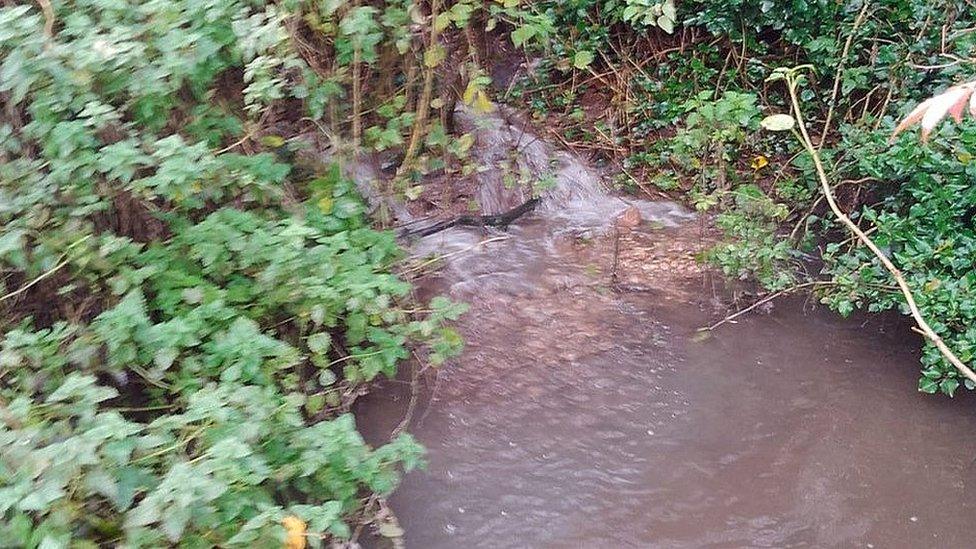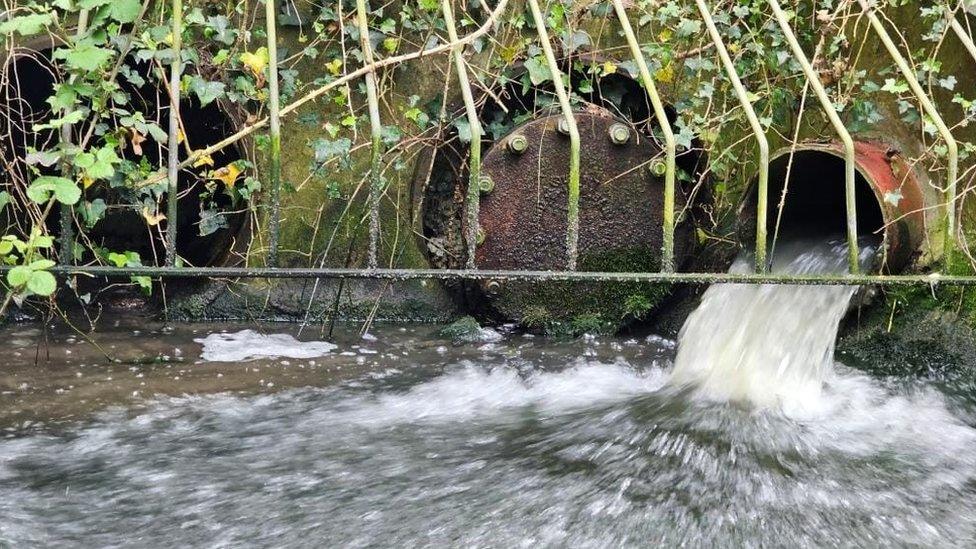Conservationists say River Misbourne is threatened by sewage
- Published

The Chiltern Chalk Streams Project (CCSP) believes some discharges into the River Misbourne from the Gerrard's Cross works fall outside guidelines
The health of a rare chalk stream is being threatened by an increase in the number of discharges from a treatment works, conservationists have said.
The Chiltern Chalk Streams Project (CCSP) believes some discharges into the River Misbourne from the Gerrard's Cross works fall outside guidelines.
Thames Water said it was working to "reduce the need for overflows during wet weather".
But the CCSP said they were occurring when there was little rainfall.
Water companies are allowed to discharge raw, untreated sewage into rivers and seas during heavy storms to prevent their systems from becoming overwhelmed.
Thames Water is the first company to publicly disclose when discharges are taking place, external, publishing a near real-time map.
The River Misbourne, which runs from Great Missenden in Buckinghamshire under the M25 towards north west London, is one of just 330 chalk streams in the world.
Latest data shows the duration of sewage discharges from Gerrard's Cross in 2022 was 1,206 hours, equating to 50.25 days or more than seven weeks, slightly up from 1,172 hours (48.8 days) in 2021.
The most recent discharge began on New Year's Eve and ended on 11 January.

Thames Water said it regarded "all discharges as unacceptable" and was "committed to reducing the need for them"
Allen Beechey, from the CCSP, told the BBC that "the discharges don't always occur when there is exceptional rainfall".
"In the six to seven days prior to when Thames Water most recently ceased discharging into the river we had little or no rain fall," he said.
"It's clear Gerrard's Cross is one of the worst offending treatment works in the capital... Thames Water is making storm discharges from 14 of its sites and if you look at the sky above us it's blue. There's been no rain for a week or so."
Mr Beechey added that sewage discharges can reduce oxygen levels in the water and any pollutants "degrade the water quality and the ecology of the river".
Thames Water said many of its sewage treatment works had been impacted by the high levels of wet weather during December and while heavy rainfall can instantly impact sewer systems, larger catchments have a slower response so there can be a delay between it raining and the flow arriving at the overflow point.
But it added that it regarded "all discharges as unacceptable" and was "committed to reducing the need for them".
"The overflows are designed to operate automatically when the sewer network is about to be overwhelmed which then releases diluted wastewater into rivers, rather than letting it back up into people's homes," a spokesman said.
"We are working hard to make these discharges unnecessary and have published plans to upgrade over 250 of our sewage treatment works (STW) and sewers to treat the high volumes of incoming sewage and reduce the need for overflows during wet weather.
"We're currently designing an upgrade to Gerrards Cross STW which will improve its ability to treat the volumes of incoming sewage, reducing the need for untreated discharges in wet weather."

Follow East of England news on Facebook, external, Instagram, external and X, external. Got a story? Email eastofenglandnews@bbc.co.uk, external or WhatsApp 0800 169 1830